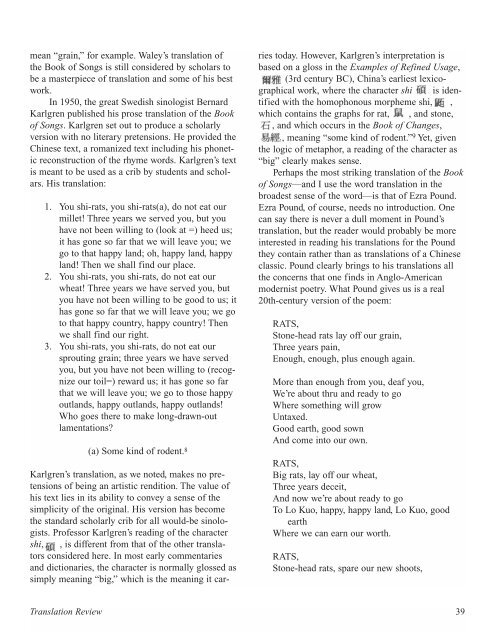Translation Review - The University of Texas at Dallas
Translation Review - The University of Texas at Dallas
Translation Review - The University of Texas at Dallas
You also want an ePaper? Increase the reach of your titles
YUMPU automatically turns print PDFs into web optimized ePapers that Google loves.
mean “grain,” for example. Waley’s transl<strong>at</strong>ion <strong>of</strong><br />
the Book <strong>of</strong> Songs is still considered by scholars to<br />
be a masterpiece <strong>of</strong> transl<strong>at</strong>ion and some <strong>of</strong> his best<br />
work.<br />
In 1950, the gre<strong>at</strong> Swedish sinologist Bernard<br />
Karlgren published his prose transl<strong>at</strong>ion <strong>of</strong> the Book<br />
<strong>of</strong> Songs. Karlgren set out to produce a scholarly<br />
version with no literary pretensions. He provided the<br />
Chinese text, a romanized text including his phonetic<br />
reconstruction <strong>of</strong> the rhyme words. Karlgren’s text<br />
is meant to be used as a crib by students and scholars.<br />
His transl<strong>at</strong>ion:<br />
1. You shi-r<strong>at</strong>s, you shi-r<strong>at</strong>s(a), do not e<strong>at</strong> our<br />
millet! Three years we served you, but you<br />
have not been willing to (look <strong>at</strong> =) heed us;<br />
it has gone so far th<strong>at</strong> we will leave you; we<br />
go to th<strong>at</strong> happy land; oh, happy land, happy<br />
land! <strong>The</strong>n we shall find our place.<br />
2. You shi-r<strong>at</strong>s, you shi-r<strong>at</strong>s, do not e<strong>at</strong> our<br />
whe<strong>at</strong>! Three years we have served you, but<br />
you have not been willing to be good to us; it<br />
has gone so far th<strong>at</strong> we will leave you; we go<br />
to th<strong>at</strong> happy country, happy country! <strong>The</strong>n<br />
we shall find our right.<br />
3. You shi-r<strong>at</strong>s, you shi-r<strong>at</strong>s, do not e<strong>at</strong> our<br />
sprouting grain; three years we have served<br />
you, but you have not been willing to (recognize<br />
our toil=) reward us; it has gone so far<br />
th<strong>at</strong> we will leave you; we go to those happy<br />
outlands, happy outlands, happy outlands!<br />
Who goes there to make long-drawn-out<br />
lament<strong>at</strong>ions?<br />
(a) Some kind <strong>of</strong> rodent. 8<br />
Karlgren’s transl<strong>at</strong>ion, as we noted, makes no pretensions<br />
<strong>of</strong> being an artistic rendition. <strong>The</strong> value <strong>of</strong><br />
his text lies in its ability to convey a sense <strong>of</strong> the<br />
simplicity <strong>of</strong> the original. His version has become<br />
the standard scholarly crib for all would-be sinologists.<br />
Pr<strong>of</strong>essor Karlgren’s reading <strong>of</strong> the character<br />
shi, , is different from th<strong>at</strong> <strong>of</strong> the other transl<strong>at</strong>ors<br />
considered here. In most early commentaries<br />
and dictionaries, the character is normally glossed as<br />
simply meaning “big,” which is the meaning it car-<br />
ries today. However, Karlgren’s interpret<strong>at</strong>ion is<br />
based on a gloss in the Examples <strong>of</strong> Refined Usage,<br />
∫∏∂Æ (3rd century BC), China’s earliest lexicographical<br />
work, where the character shi ∫” is identified<br />
with the homophonous morpheme shi, Ò,<br />
which contains the graphs for r<strong>at</strong>, π´ , and stone,<br />
• , and which occurs in the Book <strong>of</strong> Changes,<br />
©ˆ∏g, meaning “some kind <strong>of</strong> rodent.” 9 Yet, given<br />
the logic <strong>of</strong> metaphor, a reading <strong>of</strong> the character as<br />
“big” clearly makes sense.<br />
Perhaps the most striking transl<strong>at</strong>ion <strong>of</strong> the Book<br />
<strong>of</strong> Songs—and I use the word transl<strong>at</strong>ion in the<br />
broadest sense <strong>of</strong> the word—is th<strong>at</strong> <strong>of</strong> Ezra Pound.<br />
Ezra Pound, <strong>of</strong> course, needs no introduction. One<br />
can say there is never a dull moment in Pound’s<br />
transl<strong>at</strong>ion, but the reader would probably be more<br />
interested in reading his transl<strong>at</strong>ions for the Pound<br />
they contain r<strong>at</strong>her than as transl<strong>at</strong>ions <strong>of</strong> a Chinese<br />
classic. Pound clearly brings to his transl<strong>at</strong>ions all<br />
the concerns th<strong>at</strong> one finds in Anglo-American<br />
modernist poetry. Wh<strong>at</strong> Pound gives us is a real<br />
20th-century version <strong>of</strong> the poem:<br />
RATS,<br />
Stone-head r<strong>at</strong>s lay <strong>of</strong>f our grain,<br />
Three years pain,<br />
Enough, enough, plus enough again.<br />
More than enough from you, deaf you,<br />
We’re about thru and ready to go<br />
Where something will grow<br />
Untaxed.<br />
Good earth, good sown<br />
And come into our own.<br />
RATS,<br />
Big r<strong>at</strong>s, lay <strong>of</strong>f our whe<strong>at</strong>,<br />
Three years deceit,<br />
And now we’re about ready to go<br />
To Lo Kuo, happy, happy land, Lo Kuo, good<br />
earth<br />
Where we can earn our worth.<br />
RATS,<br />
Stone-head r<strong>at</strong>s, spare our new shoots,<br />
<strong>Transl<strong>at</strong>ion</strong> <strong>Review</strong> 39

















